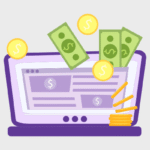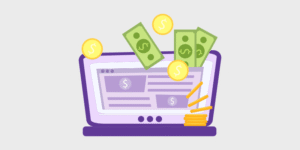
The Ultimate Guide to Selling Domain Names for Maximum Profit

In the digital age, domain names have become far more than just web addresses. They’re valuable digital real estate, brand identities, and investment opportunities all rolled into one. The business of buying and selling domain names has evolved into a legitimate industry worth billions of dollars annually.
What Makes a Domain Valuable?
Not all domain names are created equal. Several factors determine a domain’s worth in the marketplace. Short domains are typically more valuable because they’re easier to remember and type. Generic terms that describe entire industries or common activities command premium prices. For example, domains like “insurance.com” or “cars.com” are worth millions because they instantly communicate what a business does.
Brandability plays a crucial role too. A domain that’s easy to pronounce, spell, and remember will always be more valuable than something complex or confusing. The domain extension matters as well, with .com still being the gold standard, though other extensions like .io, .ai, and country-specific domains have gained traction in recent years.
The Players in the Game
The domain marketplace consists of several types of participants. Domain investors, often called “domainers,” purchase domains they believe will appreciate in value. These digital entrepreneurs might hold hundreds or even thousands of domains in their portfolios, waiting for the right buyer to come along.
End users represent the other side of the equation. These are businesses, startups, or individuals who need a specific domain for their brand or project. They’re typically willing to pay premium prices for domains that perfectly match their needs.
Then there are domain brokers who facilitate transactions between buyers and sellers. These professionals understand market values, have extensive networks, and can negotiate deals that benefit both parties.
Investment Strategies
Successful domain investors employ various strategies. Some focus on expired domains that were previously owned but not renewed, hoping to find hidden gems. Others register new domains based on emerging trends, technologies, or cultural shifts.
Geographic domains representing cities, regions, or tourist destinations can be particularly valuable. As local businesses increasingly move online, domains like “MiamiPlumbers.com” or “TokyoRestaurants.com” become attractive investments.
Industry-specific domains also present opportunities. As new sectors emerge or existing ones evolve, early investors can capitalize by securing relevant domain names before demand increases.
The Sales Process
Selling domains can happen through multiple channels. Domain marketplaces like Sedo, Flippa, and NameJet provide platforms where buyers and sellers can connect. These platforms often feature auction systems that drive competitive bidding.
Direct outreach remains another effective method. Domain owners research companies that might benefit from their domains and make personalized offers. This approach requires more effort but can result in higher sale prices.
Domain parking services allow owners to monetize their domains while waiting for buyers. These services display advertisements on unused domains, generating small amounts of revenue that can offset holding costs.
Challenges and Considerations
The domain business isn’t without risks. Market values can be subjective and volatile. A domain that seems valuable to its owner might have little appeal to potential buyers. Holding costs, including annual renewal fees and marketing expenses, can accumulate over time.
Legal issues occasionally arise, particularly around trademark disputes. Domain investors must be careful not to register names that infringe on existing trademarks, as this can lead to costly legal battles and forced domain transfers.
Market saturation in some areas means that finding valuable unregistered domains is becoming increasingly difficult. Many obvious, high-value domains were registered years ago, forcing investors to be more creative and forward-thinking.
Success Stories
The domain industry has produced numerous success stories that inspire new investors. Voice.com sold for $30 million in 2019. Insurance.com reportedly changed hands for $35.6 million. CarInsurance.com sold for $49.7 million, demonstrating the incredible potential of premium domains.
These high-profile sales, while exceptional, show what’s possible in the domain market. Even more modest sales of four or five-figure domains can provide excellent returns on investment for patient investors.
Getting Started
For those interested in entering the domain business, starting small is advisable. Begin by researching market trends and studying successful sales to understand what buyers value. Consider focusing on a specific niche or industry where you have knowledge or expertise.
Use domain valuation tools to estimate worth, but remember these are just starting points. Real value is ultimately determined by what a buyer is willing to pay. Building relationships within the domain community through forums, conferences, and online groups can provide valuable insights and opportunities.
The Future Outlook
The domain name business continues to evolve alongside the internet itself. New technologies like blockchain and NFTs are creating novel opportunities, while traditional domains remain valuable digital assets. As more businesses recognize the importance of strong online presence, demand for quality domains is likely to persist.
The rise of remote work and e-commerce has accelerated digital transformation across industries, making memorable, brandable domains more valuable than ever. Smart investors who can identify emerging trends and secure relevant domains early may find significant opportunities in the years ahead.
The business of selling domain names offers unique opportunities for those willing to learn, invest wisely, and exercise patience. While not every domain will become a million-dollar asset, the potential for substantial returns makes this digital marketplace an intriguing frontier for modern entrepreneurs.
















Post Comment